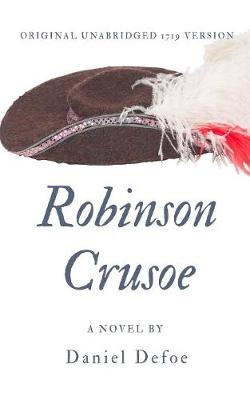The main thing that puzzles me is how this book turned into the thousands of survival adaptations. How?! Robinson doesn't have to fight to survive. He has a whole damn ship on his shore with enough supplies for years. He has a dog and a parrot and cats to keep him company, some bibles to read when he's bored, enough gunpowder to last him for thirty years, enough rum and other booze for about twenty years, tobacco to smoke... The only thing he's missing is some more clothes, but who cares about those in the Caribbean anyway.
Now on to my greatest annoyance in the entire book of Robinson Crusoe, namely Robinson Crusoe. I wanted to take one of his guns and hit some sense into that guy. He is an ungrateful, rebellious, self-pitying, racist, imperialist, bigot fool that deserves every hardship he comes across. I was also very much annoyed by how he handled his religion. Basically he only remembers that he's in the hand of God when everything is well. The moment something goes wrong (he's also completely paranoid - one footprint throws him into a fit for two years) he forgets about God and Providence and everything he said to hold so dear. If it was just this personal problem, I would have been okay with it. But the moment he gets slaves (because of course he gets slaves) he has to "save their souls" and turn them into Christians. What?! He's the worst Christian ever himself, yet he feels like he has to turn everything that moves into a Christian? Ugh.
And there are slaves. They all want to be his slaves of course.
At one point near the end he mentions shipping off a few women for his men on the island. That was about the moment I knew I didn't want to read this book ever again.
A quote wonderfully describing why I couldn't stand Robinson:
My island was now peopled, and I thought myself very rich in subjects; and it was a merry reflection, which I frequently made, how like a king I looked. First of all, the whole country was my own property, so that I had an undoubted right of dominion. Secondly, my people were perfectly subjected - I was absolutely lord and lawgiver - they all owed their lives to me, and were ready to lay down their lives, if there had been occasion for it, for me. It was remarkable, too, I had but three subjects, and they were of three different religions - my man Friday was a Protestant, his father was a Pagan and a cannibal, and the Spaniard was a Papist. However, I allowed liberty of conscience throughout my dominions.
Gee Robinson, how nice of you to allow different religions in the island you yourself decided is yours, over subjects that are stuck there with a gun wielding megalomaniac Englishman.
Robinson Crusoe is probably a good example of how people thought during that particular time period - but if that's so, I don't care for that time period.
